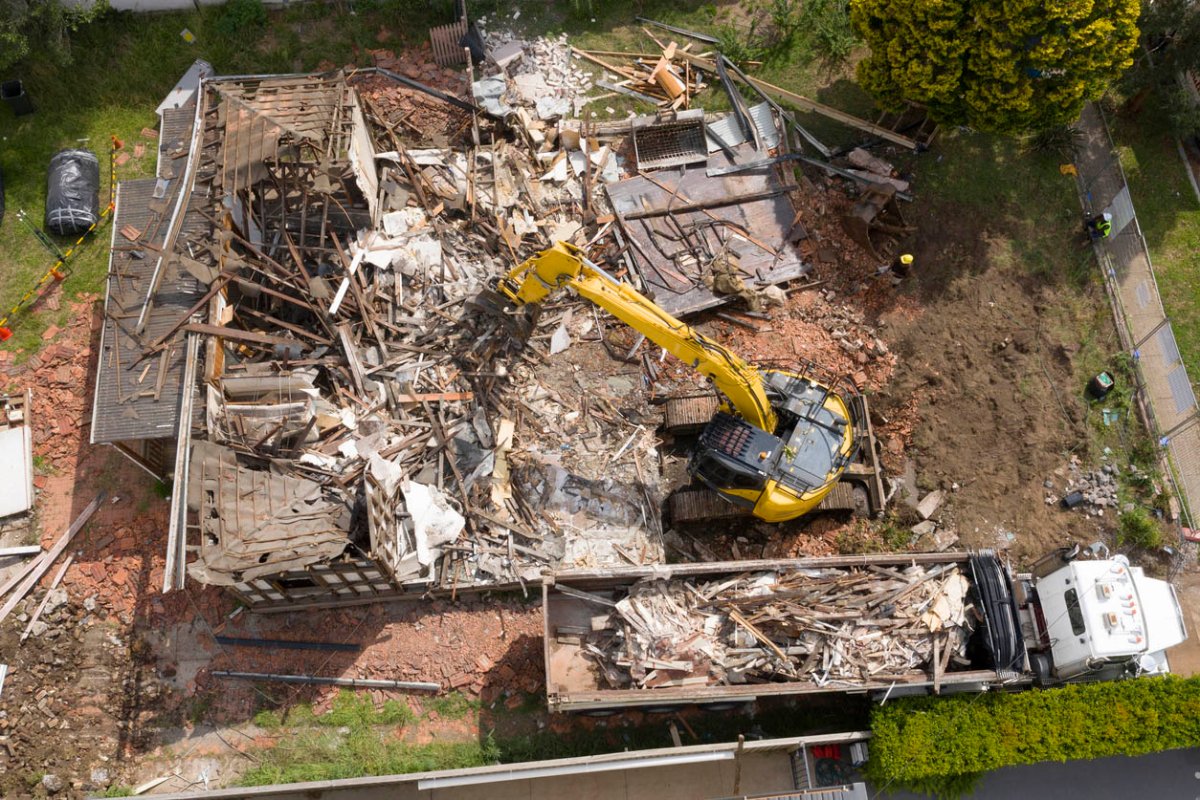We may earn revenue from the products available on this page and participate in affiliate programs. Learn More ›
- Typical Range: $3,000 to $25,000
- National Average: $18,000
Unless your home has been significantly damaged by weather or fire, demolition is probably not something you’ve actively considered. In those cases, tearing down the existing home and rebuilding may be your only option. But house demolition is an option that can be surprisingly cost-effective in several situations. It can be challenging to find the piece of land you want to live on with a suitable house already in place in a busy housing market. The cost of demolition comes in around $18,000. Paired with the average cost of building a house, it may cost less to find a great plot in an ideal neighborhood, demolish a run-down house on the property, and build a home to your specifications instead of hunting down the perfect house in the ideal area, especially when considering the average cost of building a house. Similarly, those who love their neighborhood but not their home may find that it’s less expensive to tear down the house and build a new one than renovate the existing structure. To decide if this is worth considering in your case, you’ll need some information before you start making decisions. So how much does it cost to tear down a house?
How Much Does It Cost to Demolish a House? Cost Factors
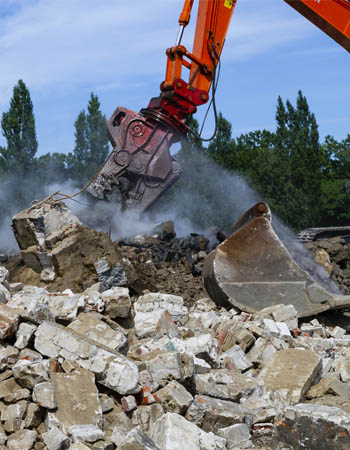
There’s no getting around the fact that house demolition is a big job—it’s not as simple as hiring a wrecking ball and letting it swing. Everything that goes into building a house has to be painstakingly undone and hauled away. The average range for demolition is between $3,000 and $25,000, which is significant; many factors feed into the overall cost. The size and construction of the house can have a bearing on the cost of demolition, but other elements, such as local permit requirements and unexpected expenses related to building materials in the house, are essential to consider as you build a budget for the project.
Home Size
The size of the home you’re demolishing will have the most significant overall impact on the project’s cost. Larger houses have more systems to deconstruct and more material to separate and dispose of, requiring more time and labor. For example, a 1,200-square-foot house will cost between $4,800 and $18,000 to demolish, while a 3,000-square-foot house will run between $12,000 and $45,000.
Permits and Inspections
You’ll need to check with your local government to determine what permits are necessary for your project. Some municipalities offer blanket permits, while others require multiple permits and inspections for different parts of the project. Many will require that the water, sewer, and gas lines be capped off before demolition, which will mean you’ll need a professional plumber to cap them and an inspection to confirm it’s been done properly before the demolition can occur. This can affect the schedule of the demolition, so it’s important to plan. Other permits may involve material disposal and adhering to safety standards. The permits average between $50 and $100 each.
Machinery
Machinery costs will vary based on the type of demolition you choose. Mechanical demolition, where large machinery handles all the teardown, will add machinery costs and specialized labor to your budget and reduce labor time. Deconstruction of a house, where all the interior materials are carefully taken apart to be reused or recycled before the structure is demolished, will incur fewer machinery costs but significantly more labor, as the process of deconstructing the interior is a thorough and time-consuming job.
Geographic Location
Is the house in a city with lots of traffic? An area where dump or disposal fees are higher? What are the average labor costs in your location? The prevailing trends and costs in your area are something you can’t change. While you may be able to negotiate a bit, you can’t compare the cost of demolition in an East Coast city to a small southwestern town.
Cleaning and Disposal
All the debris from a teardown has to go somewhere. Depending on how demolition was carried out, cleaning can be extensive. Dumping fees are based on local cost structures, but you’ll need to factor in the cost of the dumpsters and hauling fees as well. If there are hazardous materials in your home, extra disposal fees may apply. The average cost for cleanup and disposal is between $300 and $1,800. In some cases, you’ll need to hire a hauling crew separately, which can add $400 to $600 to your budget for every truckload of waste.
Labor
Labor costs vary by location and by the ratio of supply and demand. In the busiest construction seasons in areas where building is booming, labor costs will be high, regardless of what kind of demolition you choose. Off-season timelines will be less expensive because more labor is available, but bear in mind that a lot of deconstruction and demolition work requires skilled laborers, which may add to the cost overall.
Demolition vs. Deconstruction
Demolition is straightforward mechanized destruction of a building. Using machinery outfitted with hydraulics for increased power and pressure, workers will tear the building down to the ground, then load up trucks or dumpsters and cart off the debris. This is a good choice for houses in very poor condition or those that have been badly damaged by fire or weather events, as salvage isn’t possible. It’s also a less expensive option; while machinery costs are higher, the machinery does most of the work. Deconstruction involves carefully removing and preserving any materials in the house that can be reused or recycled—sometimes, even the nails in the floors can be recycled. This results in higher labor costs in general. The tax benefit of donating excised parts of the house or selling them can help offset the additional cost incurred for hand-removing elements of the home. This painstaking process can sometimes be as much as twice the cost of straight demolition. In addition, you’ll have the satisfaction of knowing that you kept usable building materials out of a landfill and made them available to consumers who might otherwise not have been able to afford them.
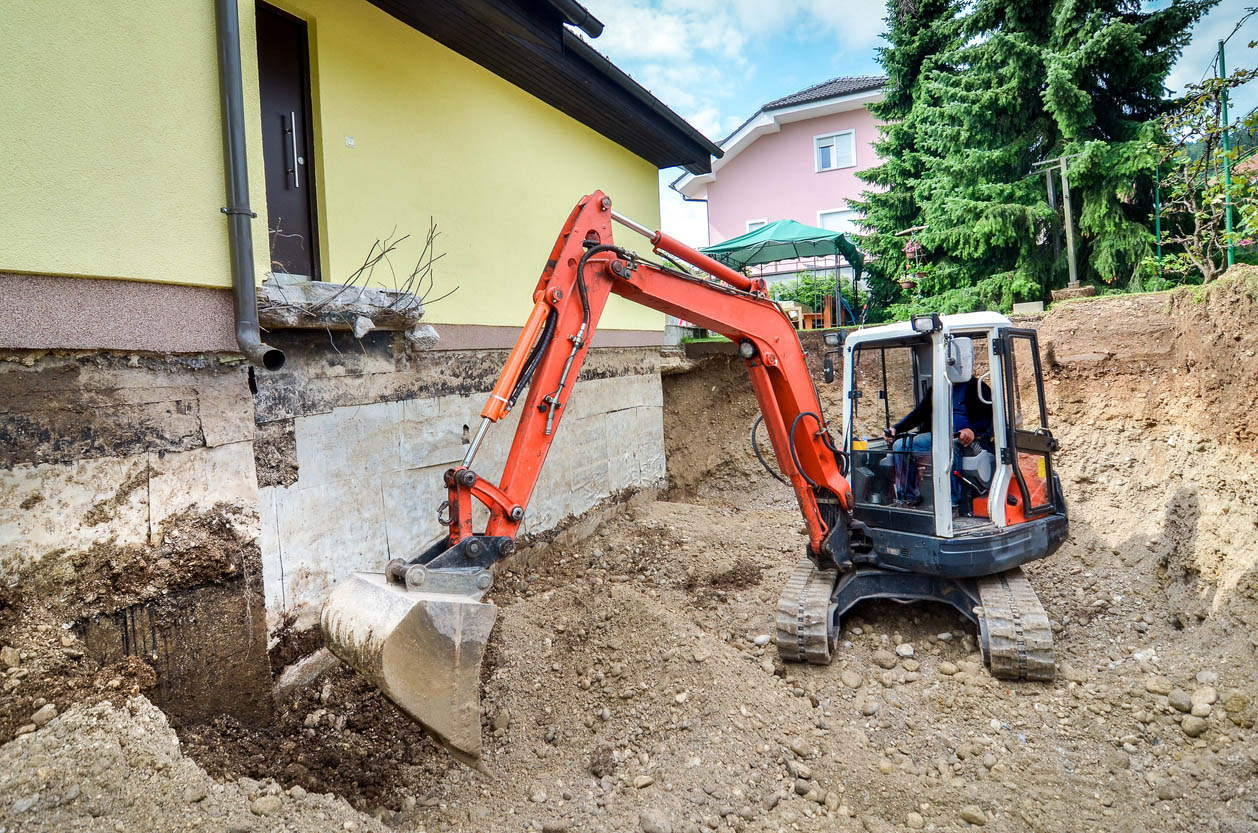
Additional Costs and Considerations
The teardown of the house itself isn’t the only budget item to consider. After the demolition is complete, there may be further actions that you need to take (and pay for).
Rebuilding On-Site
Unless you’re planning to sell the bare land, you’ll need to rebuild on your site. The average cost of building a house is between $170,000 and $485,000, with many factors contributing to the wide range. If you’re planning to demolish an existing structure, however, you can consult an architect to determine if any of the current structure, wiring, plumbing, or other elements should be preserved to incorporate into the new build. An architect will charge about $5,300 for new construction planning.
Cost to Eliminate Asbestos
If the structure you’re tearing down was built before 1990, there is a good chance that asbestos is hidden in your insulation, flooring, or paneling. Asbestos is a harmless product when it’s solid and left alone (which is why it was used extensively as an insulation product), but as it ages and when disturbed, it becomes flaky. The flakes, when released into the air and inhaled, can cause severe lung damage. A good contractor will assess your home for asbestos before any demolition. If it’s present, you’ll need to budget an average of $2,000 to have the asbestos removed and properly disposed of. This is not a DIY project: The Environmental Protection Agency (EPA) has strict guidelines for handling materials containing asbestos. These procedures must be followed to protect humans and the environment. If there’s a lot of asbestos in your house, costs can range higher, so it’s a good idea to have this assessment done early in the process.
Full Basement Demolition
If your existing home is set on a slab foundation, the cost of demolishing the slab is usually incorporated into the house demolition cost. Full basements, however, are another matter. Tearing out an entire basement means breaking down concrete supported with rebar, then hauling away all the heavy debris. Demolishing a basement can add between $5,000 and $25,000 to the cost of the project.
How Much Does It Cost to Demolish a House? Types of Demolitions
Demolition refers to the takedown of a structure, but that doesn’t necessarily mean the entire structure is destroyed. You can choose to demolish individual components of a house for replacement or the whole building. Outbuildings and additions are also fair game for removal through demolition. Your costs will be affected by the total square footage of the structure that you would like taken down, along with the job’s complexity. Sometimes demolishing just a piece of a home can be more expensive than you expect because of the care required to avoid damaging the remainder of the structure.
Partial Demolition
When looking at your own home or a prospective home purchase, you may note structures you’d like removed. Partial demolition involves the teardown of a portion of a home or an entire outdoor structure.
- Swimming pool: In-ground swimming pools have to resist a significant amount of pressure from both inside and out, so they’re complex reinforced structures that require attention and care in their removal. The average cost to remove a pool is $6,500, but it can run as high as $19,000 for very large or multi-leveled pools. This can be accomplished by complete removal or partial removal and fill-in, which will affect the cost.
- Deck: A ground-level deck is a reasonably simple demolition and rebuild; depending on the design, the average cost to remove one is about $30 per square foot. Elevated decks are more complicated and require more planning, so demolition ranges from $45 to $50 per square foot.
- Chimney: Finding an average cost for chimney demolition is challenging because chimneys have a wide range of structures. If the chimney extends into the basement or is fully built into the structure, removal will come in at the higher end of the $4,000 to $10,000 range, while a chimney that ends at ground level and is bolted onto the structure with hardware will be less costly.
- Shed or barn: Typical backyard shed demolitions are straightforward, costing between $50 and $100 per hour. This cost can shift higher if there isn’t easy access to the structure for machinery and haul away.
- Roof: Removing a damaged portion of a roof or the entire roof deck will cost between $4 and $5 per square foot or $45 per hour and up. If the roof is exceptionally high, steep, or complicated, or your local government charges high recycling fees for asphalt, the cost can edge up.
- Driveway: The cracks that develop in your driveway over the winter would suggest that breaking it up and removing it should be easy—but that’s not the case. Driveways are multilayered structures that are strong enough to support tons of vehicle weight every day. The layers must be broken up separately and hauled away correctly so the site is left level for the replacement.
- Foundation: Foundation removal rings up at $1,000 to $5,000. Given that a foundation repair usually costs between $5,000 and $7,000, this may seem like a great deal, but to rebuild, you’ll have to fill and grade the site.
- Interior demolition: Want to keep your overall home shape but change up the traffic flow inside? Demolishing the interior walls and structures, if done safely, can let you choose a whole new layout that suits your life. You’ll need some help with this because supporting walls need to be shored up so the structure doesn’t collapse, and it ranges between $1,200 and $5,000.
Total Demolition
Demolishing an entire house, interior and exterior, will cost between $2 and $17 per square foot depending on labor, permits, and a home’s complexity and features. The time it takes for total demolition is usually shorter than deconstruction, but it requires specialized laborers and machinery.
Deconstruction
Deconstruction adds cost because of the handwork and the delicacy of removing cabinets and wiring without breaking anything. Removing cabinets and cast-iron tubs carefully preserves their usefulness but takes longer and creates additional transportation needs. This method allows homeowners to save elements they like, then sell the remaining items for a profit or donate them for a tax write-off—sometimes as much as a $30,000 to $45,000 credit. Sometimes deconstruction contractors will leave the foundation in place, so you’ll have to pay for that partial deconstruction separately.
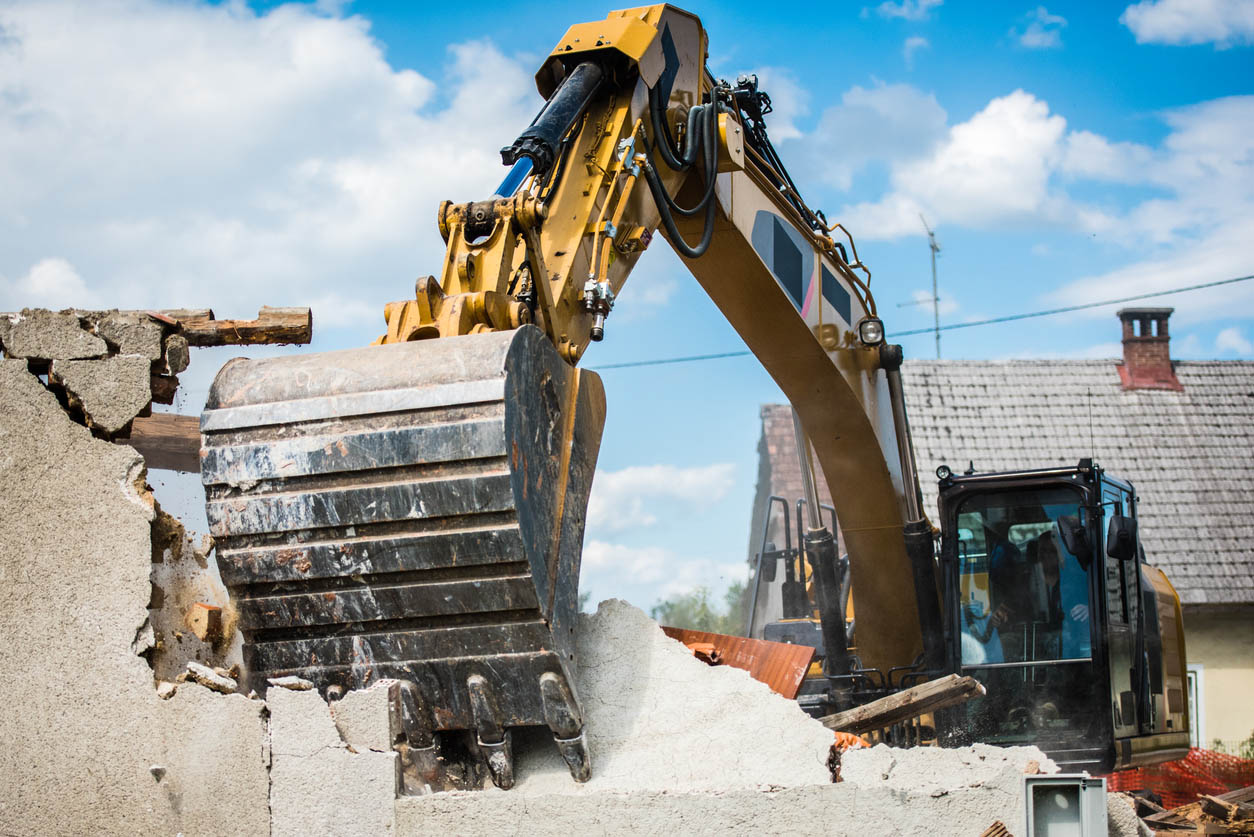
Why Demolish a House? Reasons to Tear Down a House
Demolishing a whole house may seem like overkill or an extreme option. And if you’re just looking to build a new kitchen, it probably is. There are several situations where a complete teardown is a more cost-effective path to the home you want, however, so even if it seems like demolition is too much, it may be worth considering.
Expensive Repairs and Cost Efficiency
Often when a house has been damaged or allowed to fall into disrepair, the immediate assumption is that repairs are the best option. In cases of extreme damage, however, the repairs may cost more than demolition and rebuilding. Even in cases where the damage is not severe, it’s important to note that a house has to be brought up to current building codes when repairs take place. In the case of some older homes, the additional costs required to improve the electrical and plumbing supply, remove or abate asbestos, and reconfigure structural supports may be prohibitive and more costly than starting over. The repairs may even exceed the home’s value, in which case demolition followed by a proper rebuild is an obvious choice to retain the land value.
Safety
A savvy homebuyer can get a great deal on a house and land if the house itself has been condemned or deemed uninhabitable. But actually living in such a house is unsafe and may even be illegal. Similarly, homes that have been damaged may be sold off by the bank for a very low price. Repairs on houses sold in this way are often prohibitively expensive, so demolishing the house and rebuilding is the only safe choice.
Building a Custom Home
For those already in the market to build a custom home, it can be tough to find a suitable piece of land for the planned construction. There may even be moratoriums on new builds in some coastal areas, where rebuilding is permitted but new construction is not. If this is the case, finding a great piece of land with a run-down house on it could be the perfect solution; buy the house to get the land, tear down the house, and build the home you have planned.
Insect or Animal Infestation
Many homeowners experience some form of pest infestation at least once. A qualified professional exterminator can manage some infestations. Especially if a house has been uninhabited for some time, insect or rodent infestation can develop to the degree that can’t be remedied by traditional extermination. If insects or other pests have taken over the house, a good exterminator may tell you that it must be taken down for safety and sanitary reasons.
How Much Does It Cost to Demolish a House? DIY vs. Hiring a Professional
The homeowner can almost always complete some degree of demolition. But because of the extensive permitting requirements, the potential dangers of asbestos and structural surprises, and the possibility that you or those helping you could be injured, it’s a good plan to call in a professional demolition expert before you begin. This contractor can help you understand the project’s scope, costs, and requirements and point out some potential pitfalls or surprises. Homeowners insurance may cover some portion of the teardown and any injuries incurred while working on the demolition. Demolition professionals should have workers’ compensation insurance to cover their employees in case of injury and liability insurance to protect the homeowner against property damage should something go wrong. It’s certainly fine to participate in the demolition yourself—you may even be able to save some cash by helping—but especially in the case of a complete demolition, you’ll protect yourself and your investment by consulting a pro.
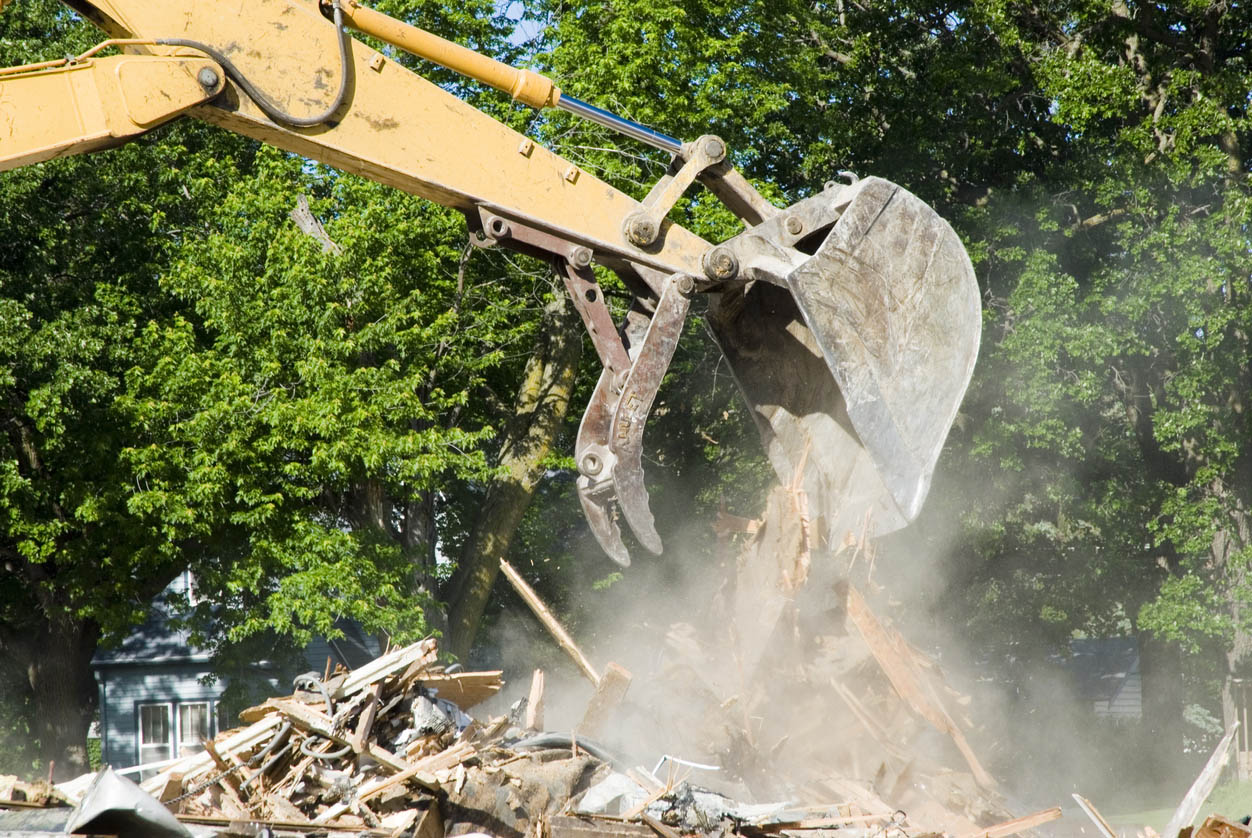
How to Save Money on Tearing Down a House
Most homeowners don’t have the heavy equipment needed to do a complete house demolition on their own. That doesn’t mean that there aren’t steps to reduce the project’s overall cost.
- Do as much work as you’re safely capable of doing on your own, such as deconstructing the interior—removing cabinets, light fixtures, doors, and anything else that is easy to remove—to save on labor costs.
- Invite friends to help with deconstruction before the professionals come in; they may want to use some of the materials and can help defray dumping costs by transporting reusable materials to salvage locations.
- Check with your local fire department to see if they need a building to use for fire training. It sounds crazy, but using actual structures to conduct burning exercises is something many fire departments do, and if they choose to use your house, you can write it off as a donation. All you’ll have left to move is a pile of rubble and ash—you’ll still have to pay to have that loaded and hauled away, but the volume will be substantially less.
Questions to Ask About Home Demolition
Before you start asking yourself, “Where are some demolition companies near me?” there are some questions you need to ask yourself. Make sure you have a genuinely clear idea of the scope of the project and whether you’re ready to take it on. Then, as you interview potential contractors, ask the questions you should ask any contractor. Are they licensed and insured? Do they have references you can check? Are they bonded? Beyond that, there are some questions you’ll need answers to before you choose a company to work with.
Ask yourself:
- Is demolition really the best choice?
- Am I prepared for the expense and inconvenience of living elsewhere during the demolition and rebuild?
- Can I afford the total cost?
- What will I keep? What do I want demolished and thrown out? What will I donate or sell?
Ask your contractor:
- Is demolition the best option for my home?
- What problems do you foresee?
- What will the timeline be?
- Are your machines upgraded and modern?
- What protections are in place for the safety of your workers?
- How will you manage hazardous waste?
- What is included in the contract? Permits? Dumping fees? Hazmat fees?
- How will you leave the property? Is cleanup included?
- What is the payment structure and time frame?
FAQs
There are a lot of elements to consider when you’re thinking about demolishing a house. It’s a big project, especially when you include an ensuing rebuild, and it can seem like there are too many decisions to make. Demolition is an option that not everyone thinks to consider, though, largely because most people don’t realize the potential cost-effectiveness.
Q. How much does it cost to demolish a 2,000-square-foot house?
A 2,000-square-foot house will cost between $8,000 and $30,000. That’s a big range, and your cost will depend on the materials in the home, your location, the cost of permits, and the haul-away and dumping costs, along with the level of deconstruction you choose versus a straight demolition.
Q. How long does it take to demolish a 2,000-square-foot house?
With heavy equipment, and depending on the house’s layout, it could take as little as a few hours. A more detailed deconstruction with demolition or a home containing hazardous materials like asbestos could take several weeks.
Q. Is it less expensive to demolish my home or remodel it?
It depends. The cost of demolishing the house and then rebuilding it may cost more than the remodel or repair. You may be able to salvage materials from the house before it’s torn down and sell them or donate them for a tax benefit. Furthermore, the cost of rebuilding may be less expensive than a complex remodel that includes the added costs of bringing an older home up to code, and the result will be a home that is built precisely to your specifications.

